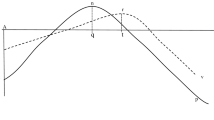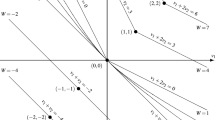Summary.
This paper examines two problems associated with the use of potential Pareto criteria in welfare economics. The first problem is the well-known intransitivity of the compensation criteria à la Kaldor-Hicks-Scitovsky. The second problem is the possible incompatibility between the Chipman-Moore-Samuelson criterion and the Pareto principle. The main result of this paper is that, in order to avoid either of these problems, it is necessary and sufficient that the domain to which these criteria are used is such that the Chipman-Moore-Samuelson criterion encompasses completely the Pareto criterion. When interpreted in a standard economic environment, this result is shown to be equivalent to Gorman's requirement of non-crossing between utility possibility frontiers.
Similar content being viewed by others
Author information
Authors and Affiliations
Additional information
Received: June 18, 1998; revised version: March 2, 2000
Rights and permissions
About this article
Cite this article
Gravel, N. On the difficulty of combining actual and potential criteria for an increase in social welfare. Econ Theory 17, 163–180 (2001). https://doi.org/10.1007/PL00004095
Issue Date:
DOI: https://doi.org/10.1007/PL00004095




